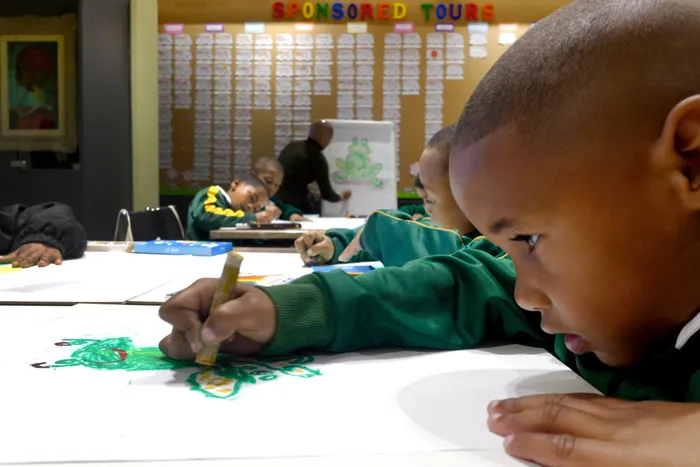We can solve South Africa’s reading crisis

As part of marking International Literacy Day, pupils at Hillwood Primary in Lavender Hill experienced the magic of books, art and nature in richly stimulating surroundings at the Norval Foundation thanks to Coronation and its literacy education partner Living Through Learning. .Picture Ian Landsberg/African News Agency (ANA)
Zelda Barends
As we join the rest of the world in celebrating another International Literacy Day on Friday, we cannot ignore the reading crisis that we face.
The latest Progress in International Reading Literacy Study (PIRLS) report released in May revealed that 81% of our Grade 4 learners cannot read for meaning.
And to make matters worse, our teachers continue to be hamstrung in their efforts to improve the literacy skills of learners.
One thing that comes up regularly in my conversations with some teachers is their frustration resulting from many challenges, including overcrowded classrooms and inadequate access to resources, infrastructure, and support.
These barriers do not only make it difficult for them to provide individualised attention to learners, but also impact their ability to deliver effective education and literacy instruction.
Teachers also grapple with curriculum changes. The post-Covid situation demands that they adapt teaching plans and curriculum implementation to deliver relevant content and meet the needs of learners considering the learning losses suffered during the pandemic.
Despite these demands, teachers continue to make use of professional development opportunities to keep up with best practices and innovative teaching methods.
One example is the emergence of in-service teachers who are being trained according to the “science of reading”, a term that seems to be quite in vogue in education circles.
The most recent interpretation of the science of reading places an emphasis on phonics instruction which is a fundamental part of early reading instruction where learners are taught how letters correspond to sounds in a language.
The field of reading research has gathered a substantial body of evidence that informs our understanding of how the teaching of reading and literacy develop and why some learners struggle during this process, and how we can enhance learner outcomes by effectively assessing, teaching, and intervening to prevent and address reading difficulties.
Although the scientific evidence base for effective reading and literacy instruction has existed for decades, the term science of reading has gained traction in the last few years and may have led to potential misunderstandings.
The science of reading refers to the body of research and evidence from various fields such as education, linguistics, cognitive psychology, neuroscience, and cognitive psychology about how learners learn to read. Thus, it is the combination of findings from these disciplines to enhance and validate current research and practices focused on the teaching of reading.
The science of reading should guide effective teaching methods and interventions to help improve literacy outcomes among learners.
It is timely that teachers learn about the science of reading. I encourage all teachers to embrace opportunities to learn about it, provided it is not sold as the multidisciplinary framework that researchers and teachers should draw on when deliberating about reading and literacy instruction.
There is a growing body of research linked to the science of reading that breaks the process of reading down into five skills that every learner must master to become a skilled reader, namely, phonemic awareness, phonics, reading fluency, vocabulary and reading comprehension.
In addition to offering opportunities for teachers to learn about the science of reading, we should also help them to intensify their instruction of the five critical skills as emphasised by the current curriculum. This can be done by developing and delivering high-quality reading instruction based on and considering evidence-based research. In this way, we will be moving one step closer to solving the reading crisis and giving our learners a fighting chance in life.
Dr Barends is a senior lecturer in the Department of Curriculum Studies at Stellenbosch University.
Cape Times
Related Topics: